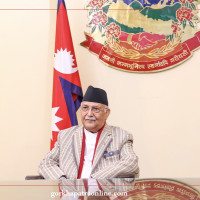- Friday, 23 May 2025
Nepal’s happiness ranking ahead in South Asian nations
By A Staff Reporter,Kathmandu, Mar. 22: As Nepal braces itself amidst global shifts in happiness index, the release of the annual World Happiness Report 2024 brings both insights and calls for reflections on the country's well-being status. Ranked 93rd among 143 nations, Nepal's happiness proportion holds steady, offering a glimpse into the multi-layered dynamics of happiness within the country.
At the global level, Finland clinched the top spot yet again, reaffirming its reputation as the happiest country in the world. Joining Finland in the top 10 are familiar faces including Denmark, Iceland, and Sweden, reflecting the prominence of Scandinavian nations in happiness rankings. Surprisingly, Israel made it to the fifth rank, while the US fell out of the top 20 as youth happiness plummeted.
Various indicators were considered in the assessment, including but not limited to GDP per capita, societal support systems, life expectancy free from health issues, individual freedom, acts of generosity, and levels of corruption within each nation or territory.
Conversely, Afghanistan grapples with significant challenges, securing the lowest rank in the survey. Despite adversities, Afghanistan's inclusion serves as a reminder of the complex interplay of factors influencing happiness, ranging from socio-political instability to economic hardships.
The findings of the research hold valuable insights for Nepal and other South Asian nations. Despite persistent challenges, Nepal exhibits a notable resilience amidst socio-economic changes. The country maintains a competitive edge in happiness within the region, standing out among its South Asian counterparts.
However, Nepal's ranking dropped from 76th position in 2023. In comparison to neighbouring countries like India (ranking 126), Sri Lanka (ranking 128), Bangladesh (ranking 129), and Pakistan (ranking 108), Nepal's happiness index presents a favourable outlook. With ongoing efforts to address social, economic, and environmental issues, Nepal remains on the path towards enhanced well-being.
However, challenges persist, highlighting the need for concerted efforts to bolster happiness levels and enhance the quality of life for all citizens.
For Nepal, the World Happiness Report serves as a critical barometer of progress and development. While the country continues its journey towards sustainable happiness, the report underscores the importance of holistic approaches to well-being, encompassing social cohesion, economic prosperity, and environmental stewardship. Experts emphasize the need for tailored interventions aimed at enhancing happiness at the grassroots level.
By fostering community engagement, promoting inclusive policies, and investing in education and
healthcare, Nepal can further solidify its position as a beacon of happiness in the region.
See Page 6
Another report delves deeper into the happiness dynamics among various age cohorts. The findings underscore the importance of addressing the unique needs and challenges faced by different age groups, ranging from children and adolescents to older adults. The global trends, challenges, and opportunities surrounding child and adolescent well-being are also considered in the report.
The research emphasizes the critical role of holistic interventions aimed at nurturing the well-being of the younger generation. The associations between well-being and dementia, emphasizing the need for tailored approaches to support the aging global population while publishing the report. The findings offer valuable insights into addressing the unique challenges faced by older adults. As Nepal navigates the complexities of development and progress, the World Happiness Report offers valuable insights into the nation's standing on the global stage.
With perseverance and concerted efforts, Nepal remains poised to chart a course towards greater happiness and prosperity for all its citizens. For Nepal, the report provides valuable insights into its well-being landscape, highlighting areas for improvement and opportunities for growth. By embracing evidence-based approaches and fostering inclusive policies, Nepal can continue its journey towards sustainable happiness and well-being for all its citizens.
Experts emphasize the need for tailored interventions aimed at enhancing happiness at the grassroots level. By fostering community engagement, promoting inclusive policies, and investing in education and healthcare, Nepal can further solidify its position as a beacon of happiness in the region.
















